*WARNING: This post includes some spoilers as well as prolific, overstated sarcasm*
Visual Effects? Visual Effects? I am mildly appalled. Is this all we care about anymore? Have we become so anesthetized to big budget that we no longer appreciate the base wonder of a conventional horror film?
I want to take a trip back to the 1930s. Specifically 1931, the release of Tod Browning's Dracula. I still consider this one of the scariest films of all time, and it's because it breaks into that realm of horror so often forgotten in today's films. The slow rise of Bela Lugosi from his tomb, the quiet seduction of all your senses via fog, full moons, and wolf howls so you're easily snapped by the vampire's bite. It's that classic, conventional treastise we've made with those old horror films to not spark an immediate reaction that make us jump and squirm, but create a lasting atmosphere, an ambiance, that makes us pause before we enter a dark corridor.
So, ten years later, the original Wolfman was released and adopted the same style and tone as its monster movie predecessors. Heavy shadows, fog, dark woods, mysterious gypsy curses, and a story that proves ultimately superficial to the overall fact that we're dealing with an exploitation, of sorts, of the supernatural. But we still watch, entertained, because we enjoy the spooky thrill.
Might I add both films were Universal releases.
Now, you are probably rolling your eyes right now. You're shrugging off my exploration and reverence for those which came before because it's 2010. These things don't scare us anymore. We are scared by the horrific nature of a murder. The jumps and frights of blood splashing on a camera lens. The unexpected assault on our senses when we have a close-up of a neck being ripped open. However, I've come to find that kind of thing commonplace now. Visual effects may have made this Wolfman more modernly accessable, but c'mon. We substitute CGI bears because they kinda look real enough and god forbid we have a real angry bear on set. It's not like we have trainers for these things. Let's not be bothered by liability forms when we can just pretend a bear exists and add it in later. Yes, we're all so happy for that kind of visual effect.
I believe a serious risk was taken by Johnson and company, because they didn't compromise the original for a modernized bastardization. So easily could we accept something dry and overtold as long as it looks brilliant. Costs a lot of money. Directed by James Cameron. Sorry, wrong topic.
Now here we have an original story of a man who's lost his brother to a mysterious wolflike entity. Examining the gypsy camp to find out more about this monster, the man is bitten, infected, and wrought with the overwhelming task of understanding his past to overcome his future...as a werewolf. The dry, incosequential investigator, Detective Abberline, is not the bad ass detective (I'm sorry to all of you who expected Agent Smith part four), but a narrative device simply used to move Lawrence Talbot's (Del Toro) story forward. Would the suspense have been building as strongly had he not been chased back to the Blackmoor estate? The story isn't The Detective...it's The Wolfman.
The mild sense of romance surrounding Gwen (Blunt) and her inevitable rise to heroine seems more a sense of love transference than true love. Love for the man who came to your aide when your would be husband is mauled by a supernatural entity would result in a obligatory adoration, to get a little psychological with it. She would feel somewhat responsible for what is happening to him, and thus thrust herself into a position where she may help him, and according the gypsy elders, that's love. I consider the fact reconciled.
Sure, the film has moments of campy conventionality: Sir John Talbot (Hopkins) ripping off his shirt post-transformation (it's the werewolf shirt vs. skins match of the century), and the fact that Gene Simmons provides the werewolf's howl. But the fact remains, this film revers its predecessor instating a nostalgia most adaptations cast aside for "Hollywoodization," and utilizes the advancements film techonology can offer to enhance a monster movie classic. The jump out of your seat scares and truely haunting imagery displays a wistfulness for the old school craft of horror. And I feel that many people knock this film because of the regard they hold for the actors (Del Toro, Hopkins, Weaving) and not for the subdued nature of the characters in favor a driving story.
Unfortunately, people go for names now, and hold certain expectations based on those names. That's going to disappoint, because this film is what truely classic horror was and still could be (as it proves), but it seems we just don't care anymore.
I'm going to see Scorcese's new film Shutter Island tonight. Ben Kingsley, Mark Ruffalo, Leo DeCaprio, Michelle Williams.
Fuck, I just want to go see a thriller about a mental institution.
Friday, February 19, 2010
Wednesday, February 17, 2010
People Looking At Art (a photo series)
Not really film related...sort of...anyway read onward!
As I got swallowed up by the Museum of Modern Art (MoMA) while in New York City this past December I noticed a lot of people taking photographs of paintings...I found this a bit odd (although I soon became just as guilty). Why do we feel the need to photograph paintings? Are we going to print it huge at home and use it as a masterpiece doppelganger? Proof to our more skeptical friends? "Yes I did see the Les Demoiselles d'Avignon!! And here's the photograph to prove it!"
Anyway, I took it open myself to take photos of the people either taking photos of art, simply looking at it or even taking photos with the paintings!
Take a look...
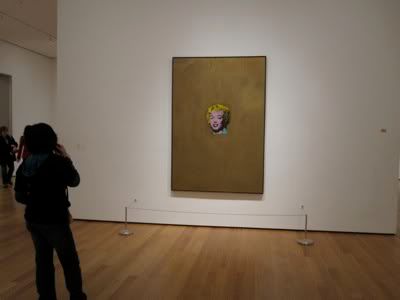
#1
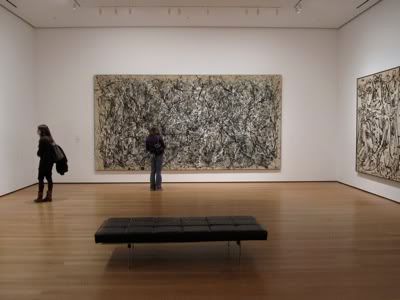
#2a

#2b

#3
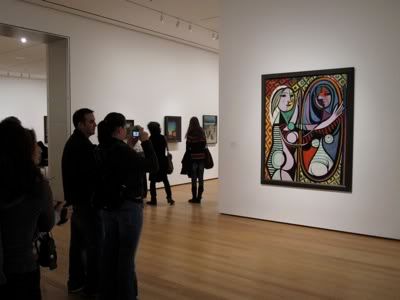
#4a
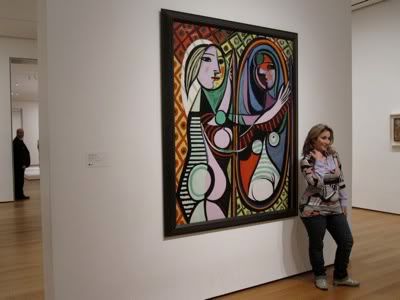
#4b

#5
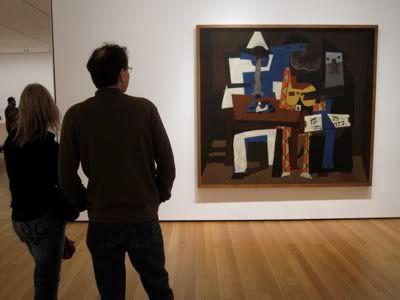
#6
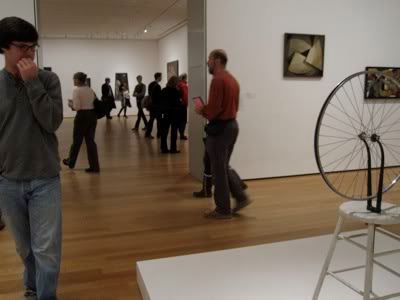
#7

#8a
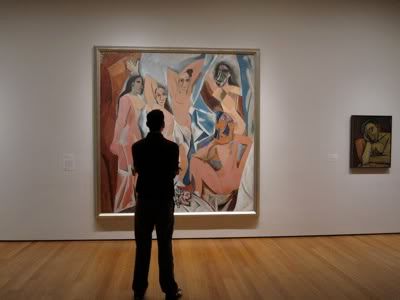
#8b

#9
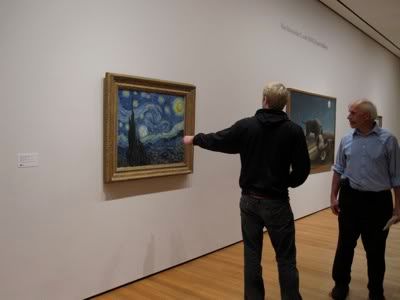
#10a
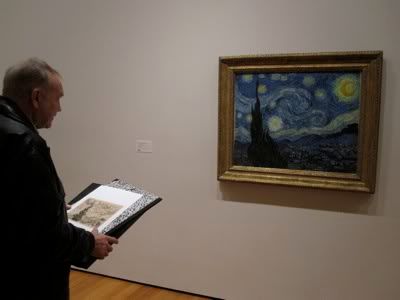
#10b
I tried to come up with witty phrases for each one, but I'm not that funny and you guys and gals can do better. GO!
As I got swallowed up by the Museum of Modern Art (MoMA) while in New York City this past December I noticed a lot of people taking photographs of paintings...I found this a bit odd (although I soon became just as guilty). Why do we feel the need to photograph paintings? Are we going to print it huge at home and use it as a masterpiece doppelganger? Proof to our more skeptical friends? "Yes I did see the Les Demoiselles d'Avignon!! And here's the photograph to prove it!"
Anyway, I took it open myself to take photos of the people either taking photos of art, simply looking at it or even taking photos with the paintings!
Take a look...

#1

#2a

#2b

#3

#4a

#4b

#5

#6

#7

#8a

#8b

#9

#10a

#10b
I tried to come up with witty phrases for each one, but I'm not that funny and you guys and gals can do better. GO!
Monday, February 15, 2010
the wolfman has no claws
so i saw the wolfman. i've been looking forward to it with mild interest for about 2 years now. "hey. benny del toro as the fucking wolfman? anthony fucking hopkins as his dad? hugo fucking weaving as the detective hell-bent on blasting his face off with a big gun? fuck yes!" i thought.
the only thing this film has going for it are its sweet visual effects. lots of entertaining murder happens in this film. if you like watching a hairy manbeast spill people's intestines, cut off heads, joyously rip off limbs, and throw people at things, and things at people, you'll probably love it.
however, if you enjoy films where not just entertaining murder, but additional things also happen which make you, like, i dunno, give a shit, you should pass. "what about the characters, what about the drama?" i can hear you ask me. good question. unfortunately, i am also wondering these things. characters? what fucking characters? this is a film where a bunch of things happen to people, and they react in various ways, and go to various locations, and occasionally say things to each other. that's about it. while the barest thread of a character arc exists for a couple of people, hugo weaving's detective abberline is the most hilariously impotent character of all time. he basically shows up, says "we gotta get this wolf!" and pursues the wolf for a couple of scenes. what the fuck, hugo. you came out of semiretirement for THIS? and the limp-dick "no, benicio del toro! we can't be lovers, i was your brother's wife!" romance subplot was about the least engaging screen romance ever.
there were several moments were the film was so obviously watered down in the editing room. watered down with sour piss. what is the deal with that big fart of an ending?
*SPOILERS*
if the writers had any balls at all, they would have had Hugo Weaving blast his head off after he was bitten. i mean what the hell, the werewolves have been killed and he stands there in front of everyone like "...oh shit." no one bothers to point out that he's going to turn into a fucking werewolf and continue to terrorize the countryside for decades. this is his one chance in the story to prove his worth, to show whether he's truly dedicated to killing the beast once and for all. how dramatic and character-revealing, right? right at that moment i was like "yes! maybe this diabetic film that has as much energy as my grandma after a four-hour sunday brunch at Hometown Buffet will slightly redeem itself with a firecracker ending!"
but no, of course not. no one says a thing, it skips the conflict entirely and cuts away. then the film quickly ends with a shot of a full moon or whatever and the sound of a werewolf howling. HOW FUCKING SPOOKY. i suspect a suicide conclusion was filmed, then shit on by a studio executive and burned. on the plus side, i guess the ambiguous ending gives us room for sequels. SIGH.
on a final note, in the trailer, a glass-eating badass villager delivers the following badass exposition: "twas 25 years ago that me father found 'im. he was tore to pieces and half-eaten, with brens and gots spilled all round..." etc. this scene popped up in the film and the guy was DUBBED OVER in a higher pitch and with less of an accent. god dammit. you idiots.
the only thing this film has going for it are its sweet visual effects. lots of entertaining murder happens in this film. if you like watching a hairy manbeast spill people's intestines, cut off heads, joyously rip off limbs, and throw people at things, and things at people, you'll probably love it.
however, if you enjoy films where not just entertaining murder, but additional things also happen which make you, like, i dunno, give a shit, you should pass. "what about the characters, what about the drama?" i can hear you ask me. good question. unfortunately, i am also wondering these things. characters? what fucking characters? this is a film where a bunch of things happen to people, and they react in various ways, and go to various locations, and occasionally say things to each other. that's about it. while the barest thread of a character arc exists for a couple of people, hugo weaving's detective abberline is the most hilariously impotent character of all time. he basically shows up, says "we gotta get this wolf!" and pursues the wolf for a couple of scenes. what the fuck, hugo. you came out of semiretirement for THIS? and the limp-dick "no, benicio del toro! we can't be lovers, i was your brother's wife!" romance subplot was about the least engaging screen romance ever.
there were several moments were the film was so obviously watered down in the editing room. watered down with sour piss. what is the deal with that big fart of an ending?
*SPOILERS*
if the writers had any balls at all, they would have had Hugo Weaving blast his head off after he was bitten. i mean what the hell, the werewolves have been killed and he stands there in front of everyone like "...oh shit." no one bothers to point out that he's going to turn into a fucking werewolf and continue to terrorize the countryside for decades. this is his one chance in the story to prove his worth, to show whether he's truly dedicated to killing the beast once and for all. how dramatic and character-revealing, right? right at that moment i was like "yes! maybe this diabetic film that has as much energy as my grandma after a four-hour sunday brunch at Hometown Buffet will slightly redeem itself with a firecracker ending!"
but no, of course not. no one says a thing, it skips the conflict entirely and cuts away. then the film quickly ends with a shot of a full moon or whatever and the sound of a werewolf howling. HOW FUCKING SPOOKY. i suspect a suicide conclusion was filmed, then shit on by a studio executive and burned. on the plus side, i guess the ambiguous ending gives us room for sequels. SIGH.
on a final note, in the trailer, a glass-eating badass villager delivers the following badass exposition: "twas 25 years ago that me father found 'im. he was tore to pieces and half-eaten, with brens and gots spilled all round..." etc. this scene popped up in the film and the guy was DUBBED OVER in a higher pitch and with less of an accent. god dammit. you idiots.
Sunday, February 14, 2010
A Theory, of Film
What is Film Theory, you ask?
Here's a step-by-step, easy to follow guide, with example essay:
When you watch a film and a character goes to the bathroom, all you ever see is an image of their face and upper body.
(Always start at the beginning of an argument, don't start with your conclusion. You're not the Orson Wells of film theory.)
This is because culturally, it has been considered lewd to depict close-ups of an anus actually pooping, while visual replacement (of "anus" with "constipated face") is more akin to literary "metaphor".
(Indicate some strange inconsistency in human behavior to get the ball rolling, and use words like "culturally," or "in contemporary culture".)
As Mulvey postulated in "The Nature of the Gaze," working closely with psychoanalytic Freudian film theories, we viewers identify ourselves with the characters we see on screen, and demand "identification of the ego with the object on the screen."
(Be sure to mention some film theorists you have been reading about in class and let someone reading know that you know what they said. Remember, to the professor these people aren't just theorists, they're friends.)
When we go to the bathroom, we think not of steady breathing, clenching sphincters, sitting over a whole in the woods, or any number of other images we could attach to "pooping," we imagine ourselves in those same medium shots we have seen John Travolta, Brad Pitt, and any numbers of screen idols in hundreds of times.
(Connect the dots for everyone and come up with a few examples, however vague they may be.)
Thus, we have become accustomed to the presentation of certain images in cinema becoming the "symbols" with which we construct a mental self-image analogous with that of the on-screen image depicting specific daily activities.
(Conclude with something deep, intellectual and convolutedly worded, or more likely, restate some famous theorist's ideas in a "contemporary" way.)
Humans are very impressionable, and drawn to order.
(Go for the gold.)
It only makes sense that continued exposure to cinematic images create the "signs" by which we create our world.
(Restate anything you said in the last paragraph. Also, any opportunity you get, use the words "signs," "signified," or "signifier." No one will ever give you a solid definition of what they actually are, so use them liberally and with panache.)
In conclusion, there should be more shots of anuses pooping than are currently in contemporary cinema.
(Make your point absolutely clear.)
Here's a step-by-step, easy to follow guide, with example essay:
When you watch a film and a character goes to the bathroom, all you ever see is an image of their face and upper body.
(Always start at the beginning of an argument, don't start with your conclusion. You're not the Orson Wells of film theory.)
This is because culturally, it has been considered lewd to depict close-ups of an anus actually pooping, while visual replacement (of "anus" with "constipated face") is more akin to literary "metaphor".
(Indicate some strange inconsistency in human behavior to get the ball rolling, and use words like "culturally," or "in contemporary culture".)
As Mulvey postulated in "The Nature of the Gaze," working closely with psychoanalytic Freudian film theories, we viewers identify ourselves with the characters we see on screen, and demand "identification of the ego with the object on the screen."
(Be sure to mention some film theorists you have been reading about in class and let someone reading know that you know what they said. Remember, to the professor these people aren't just theorists, they're friends.)
When we go to the bathroom, we think not of steady breathing, clenching sphincters, sitting over a whole in the woods, or any number of other images we could attach to "pooping," we imagine ourselves in those same medium shots we have seen John Travolta, Brad Pitt, and any numbers of screen idols in hundreds of times.
(Connect the dots for everyone and come up with a few examples, however vague they may be.)
Thus, we have become accustomed to the presentation of certain images in cinema becoming the "symbols" with which we construct a mental self-image analogous with that of the on-screen image depicting specific daily activities.
(Conclude with something deep, intellectual and convolutedly worded, or more likely, restate some famous theorist's ideas in a "contemporary" way.)
Humans are very impressionable, and drawn to order.
(Go for the gold.)
It only makes sense that continued exposure to cinematic images create the "signs" by which we create our world.
(Restate anything you said in the last paragraph. Also, any opportunity you get, use the words "signs," "signified," or "signifier." No one will ever give you a solid definition of what they actually are, so use them liberally and with panache.)
In conclusion, there should be more shots of anuses pooping than are currently in contemporary cinema.
(Make your point absolutely clear.)
Friday, February 5, 2010
Somthin's Gone Crazy
About a week ago, I attended a fine, cheap matinee showing of a film which I envied for three days straight. The theatre was vintage, with raked seating instead of stadium, and I entered down the center aisle like a red carpet first timer not knowing where to look. The back of the theatre was mildly packed with an older crowd which quickly called my attention to the fact that I was the youngest person in the house. Another wild anomaly was the sheer volume of these couples who had actually purchased theatre popcorn, an expense I always avoid due to calorie counts and $6 dissatisfaction. This is not your typical movie-going populus. Perhaps it was the matinee at 5:15pm on a Tuesday, perhaps it was the old fashioned style of the place, or perhaps it was actually just that the film I had been dying to see for all the reasons these folks would never understand had actually peaked their wise ol' interest. And who could blame them? They remember when country blues music had nothing to do with 17 year old skinny white girls.*
Crazy Heart comes off as a typical tale of the burnt-out musician who finds something for which to strive. It's a simple story about a simple man whose lifestyle just is not working for him anymore, and anyone could see it as such. As I had affectionately called it prior to viewing, it's The Wrestler set to country music. What makes the film brilliant and significant (and not The Wrestler) is Jeff Bridges. His performance is so true and scarred that "Bad" Blake is no longer a fictional country leftover, but a true musician. He is the composite of so many true stories: Kris Kristopherson, Merle Haggard, T-Bone Walker, maybe even a little Johnny Cash. And, of course, everyone is buzzing now about Bridges Oscar nomination**
Now then, as I said before, I envied this film for three days. I still do, mildly, and occasionally will ruffle through interviews and such reviewing film maker Scott Cooper's process. I still want to read the script. Cooper wrote the script (actually an adaptation) after being unable to get Haggard's life rights due to his ex-wife's interference. After spending time on tour with Haggard and putting in so much research, he was given the novel, Crazy Heart, in a culminating inspiration to write this story. This is his first script, but I suppose when you have friends like Robert Duvall it doesn't matter if it's your first time picking up a pen. After getting Bridges and T-Bone Burnett on board, it was just a matter of filming. Now, Cooper, being a first time screenwriter, was also a first time director; this includes high school plays, performance art pieces, not even a beat poetry show. Yet, the simplicity of the story, and the emphasis on character, made the shooting last a grand total of 24 days. Yes, that's right, 24 DAYS! First time writer/director...24 days.
My jealousy subsides when I watch "Bad" collapsed on the bed in his small Texas homestead nursing a bottle of whiskey. The phone rings, and Buddy giggles on the other end of the line before handing the phone to Jean (Maggie Gyllenhaal). Before the conversation surpasses our interest, "Bad" hangs up the phone swiftly and runs to the bathroom, vomiting all over creation. I am thrown back to the disparate Dude whose disinterest with follies like these is so disparate from "Bad"'s that I recognize how disarming it is to watch an old-burnt out country musician in this state. And not once does my mind travel to Jeff Bridges, as a man, as an actor. And despite all my hyped envy at the creation of this movie, I find it ultimately fulfilling that the minimalism of the narrative allows the characters to create themselves in a world free of filmmaker hands. I am happy because Crazy Heart is so untainted by the artist or visionary. It's just a story about a man and his music. Don't we all wish it was that easy?
Crazy Heart on IMDB
*I reference here Taylor Swift.
** I believe he rightly deserves the win, and for this film, too. Like no film before it could muster the impact of this performance, and I'm actually glad the academy hasn't honored him before because this one just feels so right for Bridges. A role he was made to play.
Crazy Heart comes off as a typical tale of the burnt-out musician who finds something for which to strive. It's a simple story about a simple man whose lifestyle just is not working for him anymore, and anyone could see it as such. As I had affectionately called it prior to viewing, it's The Wrestler set to country music. What makes the film brilliant and significant (and not The Wrestler) is Jeff Bridges. His performance is so true and scarred that "Bad" Blake is no longer a fictional country leftover, but a true musician. He is the composite of so many true stories: Kris Kristopherson, Merle Haggard, T-Bone Walker, maybe even a little Johnny Cash. And, of course, everyone is buzzing now about Bridges Oscar nomination**
Now then, as I said before, I envied this film for three days. I still do, mildly, and occasionally will ruffle through interviews and such reviewing film maker Scott Cooper's process. I still want to read the script. Cooper wrote the script (actually an adaptation) after being unable to get Haggard's life rights due to his ex-wife's interference. After spending time on tour with Haggard and putting in so much research, he was given the novel, Crazy Heart, in a culminating inspiration to write this story. This is his first script, but I suppose when you have friends like Robert Duvall it doesn't matter if it's your first time picking up a pen. After getting Bridges and T-Bone Burnett on board, it was just a matter of filming. Now, Cooper, being a first time screenwriter, was also a first time director; this includes high school plays, performance art pieces, not even a beat poetry show. Yet, the simplicity of the story, and the emphasis on character, made the shooting last a grand total of 24 days. Yes, that's right, 24 DAYS! First time writer/director...24 days.
My jealousy subsides when I watch "Bad" collapsed on the bed in his small Texas homestead nursing a bottle of whiskey. The phone rings, and Buddy giggles on the other end of the line before handing the phone to Jean (Maggie Gyllenhaal). Before the conversation surpasses our interest, "Bad" hangs up the phone swiftly and runs to the bathroom, vomiting all over creation. I am thrown back to the disparate Dude whose disinterest with follies like these is so disparate from "Bad"'s that I recognize how disarming it is to watch an old-burnt out country musician in this state. And not once does my mind travel to Jeff Bridges, as a man, as an actor. And despite all my hyped envy at the creation of this movie, I find it ultimately fulfilling that the minimalism of the narrative allows the characters to create themselves in a world free of filmmaker hands. I am happy because Crazy Heart is so untainted by the artist or visionary. It's just a story about a man and his music. Don't we all wish it was that easy?
Crazy Heart on IMDB
*I reference here Taylor Swift.
** I believe he rightly deserves the win, and for this film, too. Like no film before it could muster the impact of this performance, and I'm actually glad the academy hasn't honored him before because this one just feels so right for Bridges. A role he was made to play.
Subscribe to:
Posts (Atom)
